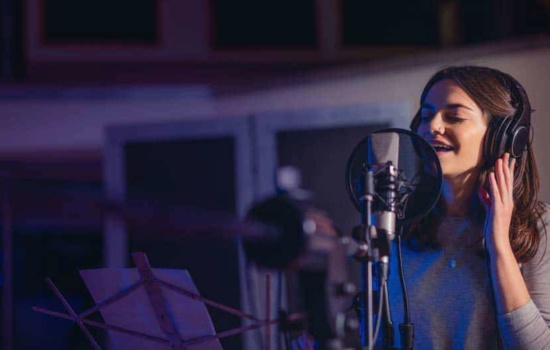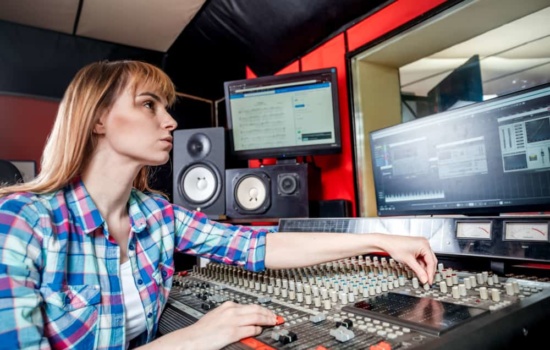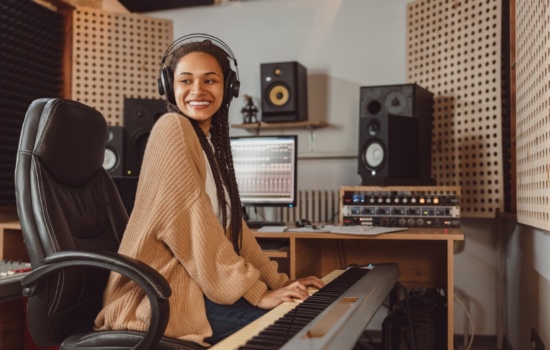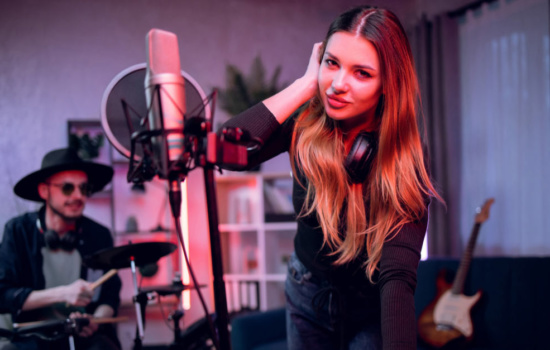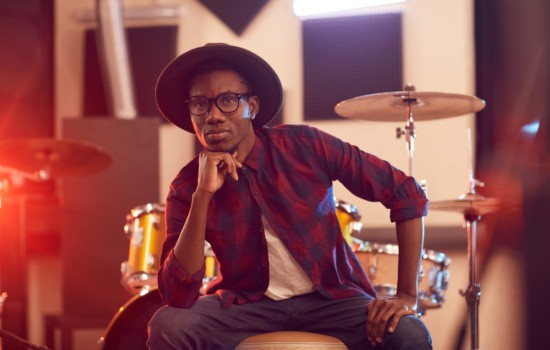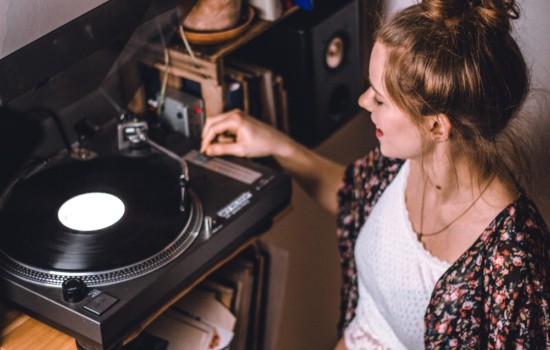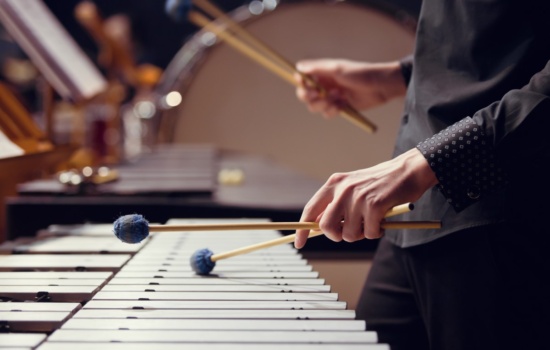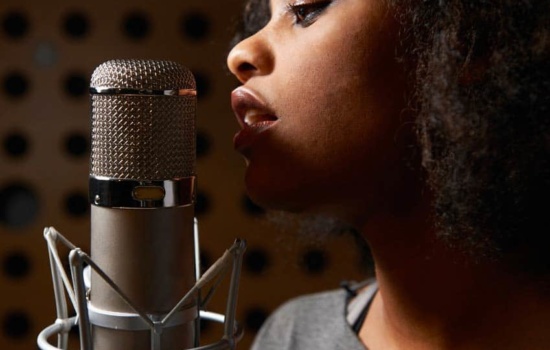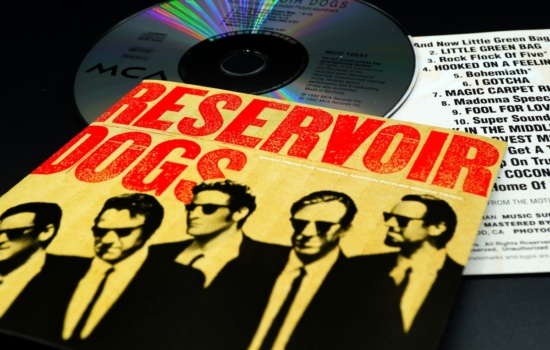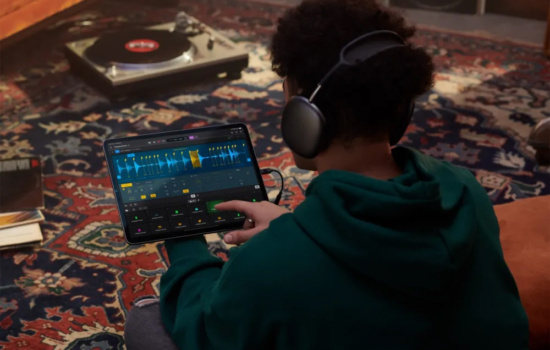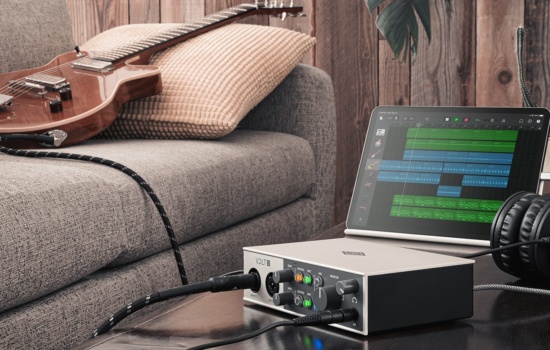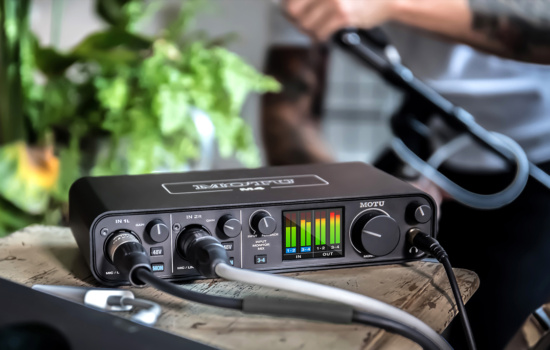Audio Engineer
Career Overview
Audio engineers help to produce recordings and live performances. They select and set up audio recording gear and sound reinforcement equipment to get the sound the musicians and audiences want. After recording, they mix the tracks down to a song you can listen to on the radio or streaming.
Alternate Titles
Sound Engineer, Recording Engineer
Avg. Salary
$54,7401
Salary Range
$24,930 to $86,8901
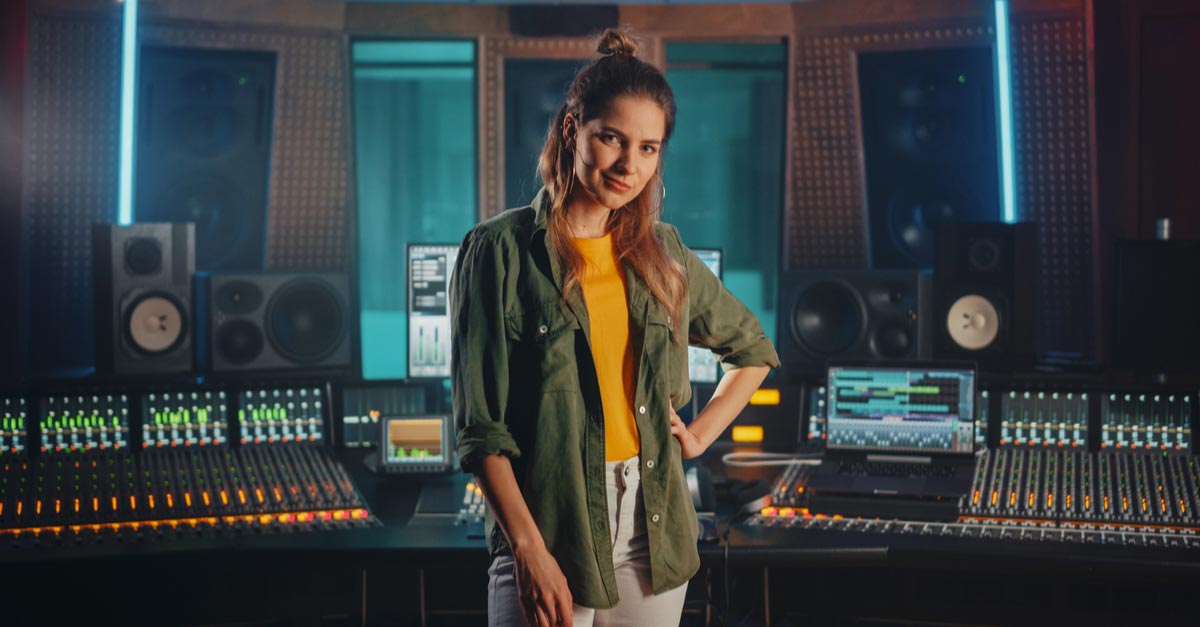
How To Become an Audio Engineer
People also ask
Career Description
An audio engineer, sometimes also called a sound engineer or recording engineer, sets up and runs the equipment used in producing concerts and recordings of music and sound, usually for commercial release, or in film, TV, radio, podcasts, gaming, advertising, or anywhere sound recordings are used.
An audio engineer merges the technical and artistic aspects of making recordings, and may also work as a music producer, artist manager, or in an artist development or A&R (Artist & Repertoire) role. Audio engineers capture live and digital sound from instruments, synthesizers, or voice, setting up microphones and running them into a mixing console, or patching MIDI sources, while making decisions about balancing volume, equalization (EQ), adding effects (FX) such as compression, delays, autotune, using autotune software, or other signal processing and audio FX software plug-ins.
An audio engineer might work in a commercial recording studio making recordings of musical artists, or they might even own their own studio. Engineers work in other areas of the sound and recording industries, such as capturing voice-over for commercials, TV or radio broadcasts, film studios, music editing, music mastering, or as live sound engineers for concert acts and in nightclubs, casinos, sports arenas, cruise ships, and amusement parks.
A talented and well-prepared audio engineer will be comfortable working with all types of recording equipment and know how to quickly set up and get a working sound level from different kinds of mixing panels, amplifiers, microphones, and speakers. They also need to quickly troubleshoot gear when the inevitable problems arise.
The audio engineer is a crucial team member who works alongside producers, writers, artists, and performers to capture valuable recordings which can be mixed and mastered for various artistic and commercial uses. The experienced audio engineer will have spent thousands of hours working on hundreds of recordings and building up their reputation as a reliable, courteous, talented, hard-working, and skillful collaborator and partner.
In this article, you’ll hear from the following Audio Engineers:
- Ariel Chobaz (Nicki Minaj, Drake, Rihanna)
- Julian Dreyer (The Avett Brothers, Steve Martin, Band of Horses)
- Bobby Owsinski (Jimi Hendrix, The Ramones, The Who)
- Brian Scheuble (Ringo Starr, Fiona Apple, Nine Inch Nails)
What does it take to become an Audio Engineer?
A professional audio engineer needs to have a strong understanding of the physics of sound waves (musical acoustics), technical and operating knowledge of the equipment used for recording sound in recording studios, understanding of music and recording software and hardware, good listening and communication skills, and a fastidious attention to detail.
Audio engineers must understand and be familiar with the various stages of audio or music production: pre-production, post-production, mixing, and mastering audio, and know how to set up and use the equipment for each of these stages. They also need to understand how the business works, and the demands of different industries where one can find work, such as theater, film, music production, advertising, videogames, concerts, sports venues, clubs, cruise ships, and mixed media.
Do Audio Engineers make much money?
Audio angineers earn a reliable income from working commercial jobs such as making recordings for advertising, industry videos for training, films, voice-over, or soundtracks for other visual media. They also do live sound for concerts and events, such as conferences. These jobs can be lucrative and there are many audio engineers making six figures, usually in big cities.
Audio engineers can provide services directly to clients such as capturing voice or music on recordings, mixing and mastering, live sound, and recording studio setup. Some audio engineers also teach, or might work as consultants on projects. There is a good income to be had for the right people who are well-positioned with strong skills.
Salary
After learning the required skills and techniques to make great recordings, engineers will usually intern at a studio, or start their own studio. For the former, whether enrolled in school or not, there will usually be no pay, and for the latter, investment may be required to buy the gear and outfit a physical space for recording.
Either way, there won’t be much pay available in the beginning, and it could take several years to work up to a situation earning a living wage. Once an intern gets hired to be an assistant engineer, they might earn a small salary, work at an hourly rate, or start taking on clients for a fee.
As experience and skills increase, reputation should follow. People will seek out experienced engineers with a track record of successful recordings, usually through word-of-mouth. There’s no better advertising than a satisfied client since they will tell others about you.
Engineers also receive recording credits featuring their name as engineer on the track.
After this initial period of learning, skill-building, and increasing reputation, the busy engineer can begin to earn a steady income, whether through freelance gigs or working on staff at a studio.
Other opportunities may also present themselves, such as live sound engineering for a touring group, working as a House Engineer at a club, or perhaps working in a specialty role such as mastering engineer, creating special sound effects for visual media (sound design), or mixing at a post-production house that works on films, TV shows, or video games.
According to the US Bureau of Labor Statistics, the average annual salary for an Audio Engineer was approximately $49,500. Audio Engineers in the lowest earnings percentile earn about $31,000 annually and the highest earners took home more than $99,470. Hourly pay ranges from $15.00 on the low side to around $50.00 and some in-demand engineers earn much higher than this. The top audio engineers earn a solid middle-class income, and some may earn even more than this if they have a specialty in strong demand or are working for a major celebrity.
Most people working as established audio engineers will earn enough to get by and perhaps a bit more; they will not likely be getting super-wealthy from it. Invariably, when asked about income, successful engineers will talk about the other rewards of the job, such as artistic fulfillment, having a hand in creating beautiful music, and the self-satisfaction of a job well done.
What does an Audio Engineer do?
You set up microphones. You choose what kind of equipment you want to use to get a particular sound out of the microphones. You help the musicians set up their guitar amps, bass amps, and drum kit in a way that will allow them to get the sound out of it that they want. That’s the first part of the process.
Once you have everything recorded, then you’re responsible for mixing it from many tracks of audio down to one stereo track—there’s a fair amount that’s involved in that. Essentially, your job is to capture what’s going on by setting up microphones and plugging things in, and then to mix it all down to a stereo file that can be played on the radio.
What degree does an Audio Engineer need?
Right now, it’s not required that you have a degree in order to get a job. That means the degree varies depending upon the school that you go to. In some cases, it’s a Music degree that you have to get. In other cases, it’s Recording Arts. Sometimes they’ll call it a Media degree.
When you get out with that degree, it doesn’t guarantee you’ll get a job because it’s not a qualifier. The only qualifier these days is a lot of technical abilities.
School helps you get those. That’s what you’re kind of looking for; you’re looking for the ability to get those abilities from a school. Usually, it’s the quality of the Teacher that makes a difference. (I speak at a lot of colleges all over the world and there’s a huge disparity in knowledge between the people that are teaching.)
There are schools all over the country that are dedicated to just recording engineering. Personally, I recommend getting a liberal arts degree because it makes you smarter; the job is way more than just the audio engineering part. There’s a lot of communication, psychology, and social skills involved in it.
So getting a liberal arts degree is very important because it teaches you all of those things. Plus, usually, when you get a liberal arts degree in recording engineering, you have to learn some music stuff, too, and having a music education comes into play a lot because obviously, you’re recording music most of the time.
I recommend a four-year degree just because it makes you more well-rounded. But again, when you’re trying to get one of these jobs, generally no one’s actually looking for a degree as much as experience and your ability to adapt to a changing social environment.
If an internship in a studio falls in your lap before you go to college, then you can go at it that way without getting a college degree because there’s only so much you can learn in school, and a lot of it’s on-the-job learning.
Which is why it’s sort of this apprenticeship/internship model—you kind of have to be in the environment to learn what you need to learn. But learning the technical side of it in school never hurts.
To me, a degree doesn’t mean anything other than you devoted time to it. It’s more about knowledge and experience for me.
Being able to work with different types of personalities is important, as well. With different types of music (audio), your skills need to be able to adjust. There are different ways to get to the same place but knowing what works best for the project is important.
When clients are around it’s good to be able to get quality results fast so everyone is not waiting around. Keeping sessions moving is important in creating a good atmosphere for great performances. Taking too much time “tweaking, looking for a sound” is a vibe buster and something I personally think you should do on your own time.
As I say that, there are those times when time is needed to get the right sound. So there you have it: no rules. Take it session by session and see what works best. Good studio experience will help you know how to approach each different session.
I love my job and I could go on and on about audio recording and mixing. Most of my experience is in a recording studio where I am recording or mixing artists and bands for song releases, movies, TV shows, etc.
I’m still at it today.
One thing to never forget, enjoy & have fun!
I actually don’t have a degree, although I highly recommend one. This business can be tricky, sometimes you can be very busy and other times struggling to find work, and having a degree can open up doors for audio engineering in other avenues like games, movies, and TV.
Having a degree makes these types of jobs much easier to land. Possible degrees to consider for audio engineering would be Recording Arts, Audio Production, Music Production, or something similar. When you can work on what you are passionate about, it really is the dream job.
Hey, what do you think about trying our new Music Career HelperMusic Career Helper really quick? It’s totally free and could help get your career moving fast! Give it a try. It’s totally free and you have nothing to lose.
Career Outlook
Successful recording and sound engineers often speak of the dedication required to reach any kind of success and say that one must really love recording and the processes involved with amplifying and capturing music and sound. They also speak unconditionally about the people skills required to succeed, being diplomatic, easy to work with, and being able to move a session along quickly to get the desired results.
For the person who is passionate about live and recorded audio and committed to doing the work to learn the techniques required of an engineer, there will eventually be more and better opportunities, as there is significant growing demand for competent and skilled audio engineers in the music industry.
Music, both recorded and live, is used and consumed widely around the world. Every time music is created or produced, someone must engineer the recording or the performance. Today’s music and sound reproduction equipment are both increasingly complex, and the demands placed on musicians and audio engineers are varied and intense.
Computers play an ever-increasing role, whether it be in digital automation or virtual reality (VR). Since the audio engineer needs to bridge the gap between the creative and technical aspects of recording and sound production, they will need to prepare themselves with strong skills and be able to think quickly on their feet.
What is an Audio Engineer's salary?
According to the US Bureau of Labor Statistics, the average annual salary for an Audio Engineer was approximately $54,700. Audio Engineers in the lowest earnings percentile made less than $25,000 annually and the highest earners took home more than $86,900.
Career Path
Audio engineering is a highly competitive field, and to get to the point where one can earn a living, almost all engineers spend several years learning the craft and skill, often working for free, whether as an Intern, assistant engineer, or lead engineer on projects. Most audio engineers describe the job as a lifestyle, since long hours are often required, and sometimes travel, initially all at relatively low pay.
Many of the skilled engineers working today started out learning on the job, while some others who had the chance attended elite audio engineering schools or training programs. Breaking into the music business is never easy, but it’s likely there will always be a demand for great audio engineers. This means that the talented and ambitious person who is strategic, deliberate, and persistent in their approach will have lots of terrific opportunities to take advantage of while establishing their career.
Networking plays a role in finding work as an audio engineer, whether a salaried job (relatively rare) or more often, as a freelancer. Freelancers are hired to work on projects by artists, studios, producers, and companies that need recordings. Since all recording projects have a beginning and an end, most engineers work on multiple projects simultaneously.
The top engineers will have GRAMMY® nominations and other industry awards. An experienced and in-demand audio engineer must actively manage a very busy schedule and will be able to charge top dollar for their services.
Is audio engineering a good career?
Yes, it’s a great career if you love music, like working in a creative atmosphere and you enjoy collaborating with artists and musicians. Besides engineering, there are other avenues you can go with an audio engineering career: podcasts, music, movies, TV, dialogue, sound EFX, gaming audio, radio, live sound, DJ, management, music labels, etc.
There is also the road life if you like to travel. There’s the Live Sound Engineer who travels with artists. Or the House Engineer in the club doing the sound for the different acts that come in.
Side note #2: There’s a misconception in the music biz that you can be an overnight sensation and get a hit right away. To be great and have a sustainable career it takes years of “woodshedding” your craft.
Practice, practice, practice. The same goes with being a great Audio Engineer. Along the way of being an Engineer comes learning more about music and production, understanding what it takes to make a great song and how the audio can best suit the song.
It’s a good career if you want do something that you like doing. You can make a middle-class income from it but it takes a while and you have to be good at it.
You’re going to have to go through several years of working really long hours for not much money, so it’s one of those careers where you’ve really got to be into it, or you’re not going to make it to the point where you’re making a decent living at it, ever. Because you’re going to get tired of working twelve-hour, days six days a week for, you know, ten or twelve dollars an hour or something.
Our Studio Manager always says this is less of a job and more of a lifestyle. What that means is that you’ve really got to be into doing what you’re doing because if you look at it on paper, it’s not going to look great.
But if you like music, you like listening to records, and you like the process of making albums, then there are emotional and psychological rewards (but not as many financial ones).
I have another friend in Nashville who says if you want to make a good living at this, then your focus most of the time, should be on being the best person in the room at it, because that’s pretty much the only way to do it. You always have to be better than the people around you because only one of you is going to move to the next tier.
It’s a great career if you love problem-solving, and balancing your technical and creative attributes. I am always getting better at my craft and am always challenged.
That being said, I have also always had the belief that if working on audio isn’t what you are already doing in your free time because you just can’t help it, then working in the audio industry probably isn’t for you.
It takes a lot of commitment and sacrifice in order to move ahead and become successful, and people who aren’t truly passionate about it on a core level get weeded out quickly.
Also, Audio Engineers that work on records are typically freelance, meaning there is no union and hours are usually set by the artist. That can mean long and weird hours until you become so in demand you can start setting your own hours.
It can be, but just like everything in the music business, it varies. There are lots of ups and downs, and it can take quite a while until you break out and are making a steady amount of money.
The people that I grew up in the business with who have made a good living are the ones that have been persistent and have stayed at it no matter what. In the meantime, there are lots of people who fall by the wayside just because life kind of does that to them. It’s a matter of if you’re willing to stick at it long enough—because it could take some time.
How do I become an Audio Engineer?
Audio engineering in studios generally goes through the internship process. Usually, you have to be an Intern at a studio, and then gradually work your way up to being an Assistant Engineer, and then a Lead Engineer, and then if you want to keep going in that direction, then eventually you produce records also.
You can get degrees in recording engineering that are generally offered either by specialty schools or by liberal arts schools, though it’s not necessarily a requirement. At the studio that I work at, Echo Mountain Recording, we want our Interns to be in school for it, just because we doubt vaguely interested people that are not actually trying to do the thing. It helps to be in school for it.
There are several ways to become an Audio Engineer:
- By the necessity of needing to record audio (either music, dialogue, effects or whatever you want to do) and then by buying the equipment to do so. Learn by doing.
- Working at a studio as an Intern and learning from the Engineers who work at the studio and learn from the Staff Engineers. Depending on the studio, the chance at hands-on work can be very high.
- At an audio engineering school, you can learn as well. In saying that, to me it is imperative to have hands-on wherever you learn. Having time to sit with EQ, microphones, and gear and listen to the differences. Also, learning compression, limiting, effects, editing songs, etc. It’s a lot of info to learn and will take years to tune in your chops. To me, wherever you can have the most hands-on is the place to go.
Side note #1: With all of the bedroom/home Engineers out there, when I get songs to mix there is a big difference between them and the experienced guys. My work is harder with the inexperienced guys.
A great Engineer has a “deep” understanding of audio from many years of being around music–not just working with audio but listening to music through the process of making a song. So much happens in making music that it isn’t all about gear but also about the experience with the tools and the thought process in how to treat a recording or a mix for a song.
This is a very big questions, and there are many paths depending on what type of Audio Engineer you want to be. For me, I always wanted to work on records, as music has always been a part of my life. I went to school and earned a journeyman recording certification in 6 months, followed by an internship at a large commercial recording studio.
That internship led to being hired as a Runner, and then moved up to Assistant and then Engineer. However, a big part of my ability to move forward, and quickly, was how well prepared I was. I had already become well-versed in Pro Tools by recording and mixing myself and my band all throughout high school.
I then took some recording classes in community college as well as some music theory classes. This all led to me acing my entrance exam at Musicians Institute, which placed me at the top of my class, which led to my internship and subsequent hiring, all before graduating with my certification.
Point being, the more prepared you are, the more opportunities will present themselves.
There are many paths. One way is to just study on your own. That usually means finding out as much information as you can and then practicing, doing your own recordings, doing your own mixing, things like that.
Another way is to study under somebody. (That’s maybe the most effective way.) Then another way is to go to school and learn how to do it—but you still have to find a job when you get out, so it’s not the fastest way.
Generally speaking, those are the three paths. There are other paths, too. Many musicians who work around the studio learn a lot by just watching and they become good at it. That usually means you have some experience being in the studio already, but you’re on the other side of the glass, for the most part.
Experience & Skills
An engineer must first and foremost know their way around the recording studio. Understanding the different applications of an incredibly wide array of equipment is paramount to success. A solid understanding of music, musical instruments, acoustics (the physics of sound), analogue and digital sound technology, and electronics is required. In the increasingly computerized and automated world of music and digital recording technology, having top-notch computer skills is also required.
Learning how to troubleshoot, quickly figuring out what a new piece of equipment or software program does, knowing about the characteristics of myriad gear from microphones to outboard effects (FX) and plug-ins–there’s a seemingly endless list of stuff one needs to know to work as an engineer.
That’s why most engineers start out as an intern and then become an assistant engineer, working under a master in an apprenticeship role. The best way to gain the needed knowledge and experience is to work under a consummate master who is willing to teach an intern or assistant the needed skills.
Beyond understanding and knowing how to use the gear, an engineer must know how to quickly set up all the equipment at outset and then tear it down and put it away at the end of the session. They must know how to properly maintain and even service some gear, and in the case of the live sound engineer, how to pack and transport it.
Learning how to prepare for a session and operate the equipment properly is important, but so are people skills. The best engineers are easy to work with. They know how to make the musicians and the producer feel relaxed and at ease. They are effective communicators and have superb diplomatic skills. It’s important to be able to work well under pressure.
They must solve technical problems first and foremost, but they also need to know how to provide artistic solutions that will satisfy finicky and temperamental artists who may not be accustomed to working in teams. The engineer will need to understand the creative process and know something about psychology, too.
Do Audio Engineers need a degree?
Most audio engineers study in college at least up to an Associate’s Degree. There are many schools, colleges, and vocational schools which offer training and a credential to prepare graduates to enter the field of audio engineering. There are four-year bachelor’s degrees and even master’s degrees available in audio engineering. Many students also study music, arranging, film scoring, music production, or sound design to prepare for careers.
Not everyone needs to earn a degree, but there are real advantages from doing so. School is an excellent place to learn the needed skills, and also to meet people to network with for a future career, such as fellow students, faculty, and guest lecturers. There are also internships available to graduating students, which could be very helpful in breaking into the industry. Professional recording studios and touring companies often hire interns, who then have a chance to prove themselves and learn under real-life conditions.
How long does it take to become an Audio Engineer?
There will always be exceptions to the rule, but I would say on average several years to become an entry-level Engineer. It can be fun doing your own recordings, but to run a full session in the hot seat, with the pressure to make everything sound amazing quickly, is a skill and an art.
There’s sort of a learning curve. It used to be that you started at a studio, at the lowest position possible. You’re a Runner or a Gofer, and if you’re lucky you get to hang around the studio and see things.
Usually, especially at the bigger studios, they encourage that because they want you to succeed, as well. So if a session isn’t too stressful, then you’re usually allowed to just hang out and watch. You start there, and then usually, after X amount of time, you become an Assistant Engineer.
At some point and time, usually, it’s two or three years (although it can go longer for some people), you should be ready to be able to handle your own sessions. It doesn’t mean you’re going to be great at it, but you can do it, and what I’ve seen is there are some people that go really fast. If they’re with the right artist, within three, four, or five years they’re working on multi-platinum artists.
A lot of that has to do with being in the right place at the right time. In other words, they’re getting good just about the time the artist is getting good. They’re both more or less starting together. That has happened a lot.
Or it could be that the artist just likes that particular person because if you have a really good personality, you tend to have a leg up on everybody. Personality really matters because if you’re going to be locked in a room with somebody for a long period of time, you want to be able to get along with them. It matters more than people think.
There are other ways to do it; that doesn’t mean that is the only way. Again, you can learn yourself. That takes a lot of dedication and a fair amount of time until you get good, and the reason why is you don’t have anybody that’s helping you, usually. You don’t have a reference point to understand what is actually good and what isn’t. So it’s possible, but I’d say it almost always takes longer.
I went to a four-year liberal arts college, then I interned at a music venue and worked at the music venue for three years, and then got a job at a recording studio. To learn the stuff that you need to learn in order to be an Audio Engineer that could get an entry-level position, you should expect to basically do it for free for a couple years.
If you add schooling on top of that, then five or six years [to become an Audio Engineer]. (The only caveat is the specialty schools are sort of these condensed six- or eight-week programs.)
You can get a degree in audio engineering if you go to a place like Full Sail, [which] is one of the most popular ones. Then you’re going to have to turn around and get an internship, which could turn into a job in six months or two years or not at all.
Because it’s a very competitive job field, too. The music industry keeps shrinking, and the number of commercial studios keeps shrinking, so unless you’re going to open your own studio or work out of your basement—running your own business—getting a job working at a studio is becoming increasingly more difficult because there just are less jobs out there.
That depends on you and the connections (clients) you have who need you as an Engineer.
Getting audio gear and starting is one way. If you want to record live instruments, that will take more time if you want to be a good Engineer. Having access to recording studios and gear is a major bonus and it will take a good amount of time to be good.
Education & Training
There are many excellent schools, conservatories, colleges, universities, and institutes specialized in training students for careers in music and engineering. There are bachelor’s degrees, either a Bachelor of Music (B.M.), Bachelor of Science (B.Sc.) or Bachelor of Fine Arts (B.F.A) and even master’s degrees in music production and audio engineering. There are also certificate programs and individual courses for aspiring Audio Engineers.
Most programs of study will require students to attend classes in person, since they will be learning skills on specific equipment in physical recording studios, however, there are also some courses available fully online remote. The top schools are expensive, but they will usually have many scholarships available.
If it’s possible to attend school, that would be an ideal solution for most people seeking a career in audio engineering, since it allows enough time to study and learn about all the aspects needed to support a high-profile career. For example, it can be very useful to take music classes, learn about instrument acoustics (the physics of acoustic tone production), electrical engineering, music technology, and digital music software, all while studying liberal arts to broaden one’s education and scope of knowledge. This will likely prepare the budding Engineer for achieving quicker success and make it possible to go further in seeking a viable career. Being enrolled in a college may also be a requirement for some internships.
Not everyone chooses to attend school, and not everyone needs to. Some learners also train alongside an accomplished Engineer or take a few courses here and there, while working in the studio environment, and that’s certainly also a great way to learn. As the old saying goes: “If you hang around the barbershop long enough, you’re likely to get a haircut.”
A lot can be learned by watching and observing, asking questions when you have the chance, and taking note of the resources and self-study materials available. That’s not for everyone, but it might be right for some people. However you learn and study, you will likely continue your learning even after any formal education, since recording arts is an applied field and there is always learning by doing.
What makes a good Audio Engineer?
Being consistent, reliable, and able to hit deadlines while exceeding expectations. This can become challenging especially when you start to juggle multiple projects at once, so having a strong independent desire to do whatever it takes is essential.
Having the ability to be proficient at the technical part of your job, but also be skilled at quickly identifying and sussing out the social dynamic if you’re working with bands, which are like five-way marriages. You have to figure out how much you need to be involved on an artistic level, which sometimes is none at all. Sometimes you really will have to guide people through the process.
You have to be able to quickly assess that kind of stuff and find your role in the situation. The ultimate goal of an Audio Engineer is to be invisible, meaning that you are facilitating the process of recording music in a way that doesn’t get in the way of the artist’s ability to feel comfortable and creative. Be sure that you are getting what you need to get done and not getting in someone’s way getting it done.
I come from training for years as a Runner and then a Staff Engineer, working with the top artists and studios in the world. It’s not only about your knowledge & skills but your attitude, patience, and studio etiquette.
A real plus is having a third sense of knowing what is needed next. In the days of recording sessions with artists and musicians coming together and playing songs at the same time sessions are busy and it is great to have an Assistant with awesome skills in the room helping.
It starts off with great studio etiquette. You’re working with creative artists and Engineers, Producers who have been doing the gig for many, many years. It is not your job to tell them what to do. It is the Assistant’s job to understand what is needed to help the session run smoothly.
Does it look like the musician is having a hard time with his headphones or is the Producer looking for something? Help them so they can focus on doing their part. All the while, you are learning and listening to what’s going on in the room. Listen to the conversations. These are the best lessons you can learn.
I’ve had many Assistants tell me what I should use on drum overheads or what compressor to use on a microphone before I get to the studio…when really they are there to assist the seasoned Engineer and learn from him.
I’ve learned so much from working with top Engineers during my years of being a House Engineer. I took things I liked from different Engineers and made it my own. Engineers record and mix audio in their own particular way. It’s nice to see the differences and choose what you like and mend it into your own style. Or copy–it’s all good.
There are two primary skills. One is the ability to hear really well and to hear minute differences in things that are going on. (That comes with experience. You can teach some of that. There are many things that are obvious, but not until they’re pointed out. It’s [through] experience where you learn those things.)
The second thing is diplomatic skills because you’re dealing with people. Sometimes you’re dealing with a group of people that have varying artistic views on what they’re doing. You have to be a diplomat.
Sometimes it’s between a record label and an artist. Sometimes it’s an artist and a Manager. You have to be careful that you don’t either get in the middle of it, or you have to know how to deal with it because there’s a certain amount of stress that goes along with it.
There’s another thing, too. It really helps—although it’s not essential—if you’re a musician and you have a musical background. I think a majority of Engineers have that these days. It wasn’t always like that, but it more or less is now, where there’s at least some sort of musical background, that becomes—depending on the field of audio engineering that you’re going into— more and more critical.
For instance, if you’re going to be recording classical music or orchestral music, then it’s essential that you know how to read a score. But if you’re just doing pop music, then no, that probably doesn’t matter because the artists don’t. Nothing’s written out and the artists don’t know music, either. It really depends.
You'll Want to Read These Articles Too
Sources
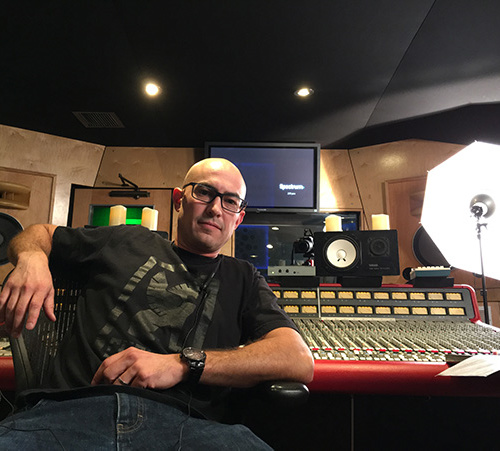
Ariel Chobaz
Ariel Chobaz is a GRAMMY-nominated, multi-platinum mix and sound engineer with many Billboard #1’s to his credit. After graduating from Musicians Institute with a degree in Recording Arts Technology, he became a strong force in the recording industry, quickly breaking records like mixing the most singles charted by a female rap album with Nicki Minaj’s Pink Friday and the record for most songs on Billboard Hot 100 with one artist. His mix on “Super Bass” propelled it to be one of the highest-selling singles in US history. While making radio hits, Ariel has gained the biggest honor in the business with an Album of the Year GRAMMY nomination as a recording and mixing engineer for Rihanna’s Loud and a win for Drake’s Take Care.
In the Fall of 2017, Ariel gained another #1 hit with his engineering on “Almost Like Praying” by Lin-Manuel Miranda, Jennifer Lopez, Gina Rodriguez and others. Throughout his career, his clients have included Nicki Minaj, Rihanna, Drake, Justin Bieber, Christina Aguilera, Britney Spears, Tyga, Lil Wayne, B.o.B. and many others that love his sound, work ethic, and passion for music.
He has also served as an instructor at Pro Mix Academy. His career has been featured in ABC News, Produce Like a Pro (several times, including “Mixing Hip Hop Vocals”, “Mixing Hip Hop”, “Top 5 Plugins”), Pro Audio Files, Pensado’s Place, Billboard, Heavy.com, Happy Mag, and Romper.
Check out his discography here. You can work with Ariel via his SoundBetter.

Bobby Owsinski
A long-time music industry veteran, Bobby Owsinski started his career as a guitar and keyboard player, songwriter and arranger, eventually becoming an in-demand producer and engineer working not only with a variety of recording artists but on commercials, television, and motion pictures as well.
Living in Los Angeles and always on the cusp of the latest technology, he was one of the first to delve into surround sound music mixing, co-founding the industry leader Surround Associates and eventually working on over a hundred surround projects and DVD productions for a variety of legendary superstar acts including The Who, Willie Nelson, Neil Young, Iron Maiden, The Ramones, and Chicago, among many others.
Bobby mixed a #2 album on the Billboard Blues charts for Adrianna Marie and her Bluescutters, and produced and mixed a #6 on the iTunes rock charts for the band SNEW.
Along the way, he has taught various disciplines of audio recording and multimedia production at Berklee College of Music, Trebas Recording Institute, and Nova Institute, and has been a guest lecturer at numerous colleges and universities around the world. He has also authored several courses for Berklee as well as the Multimedia Production curriculum for Nova Institute and over 20 online video courses for Lynda.com and his own BobbyOwsinskiCourses.com.
Combining his music and recording experience along with an easy to understand writing style, Bobby has become one of the best-selling Authors in the music recording industry with two dozen books that are now staples in audio recording, music, and music business programs in colleges around the world, including the best selling Mixing Engineer’s Handbook, The Music Producer’s Handbook, Social Media Promotion For Musicians and The Music Business Advice Book, which was a #1 best-seller on Amazon.
He has also penned hundreds of audio-related articles for a variety of popular industry trade publications including Pro Sound Web, Surround Professional, EQ, Billboard, Film & Video, The Hollywood Reporter, Pro Sound News, Mix, Grammy Magazine, Electronic Musician, Music Connection, Recording Engineer/ Producer and Music Executive Insider, among others. He also is a senior contributor to Forbes, writing about the “Big Picture” issues and trends of the music business.
Bobby keeps a busy schedule providing keynote addresses, masterclasses and workshops at various colleges around the world. A frequent Moderator, Panelist, and Program Director for a variety of industry conferences including NAMM, he has served as the Producer of the Surround Music Awards, and is one of the Creators and Executive Producers for the Guitar Universe and Desert Island Music television programs. He has also appeared on CNN and ABC’s 20/20 as a music branding and audio expert.
Get more sound advice from Bobby via Nimbus School of Recording & Media, Envato Tuts+, the PreSonus blog, the Working Class Audio podcast, the Inspirational Creatives podcast, Pro Tools Expert, and the DIY Musician blog.
Bobby’s expertise has also been showcased via Sonic Scoop, Hypebot, Tape Op, Produce Like a Pro, Wisconsin Public Radio, and Showbiz Cheat Sheet.
Bobby’s Music Production blog at bobbyowsinskiblog.com is one of the most popular in the industry with over 14 million views, while his Music 3.0 music industry blog at music3point0.com is well over the 5 million mark. Bobby’s Inner Circle Podcast reaches more than 120,000 listeners per month and frequently sits in Apple’s Top 200 podcasts. His many online courses and programs can be found at bobbyowsinskicourses.com.
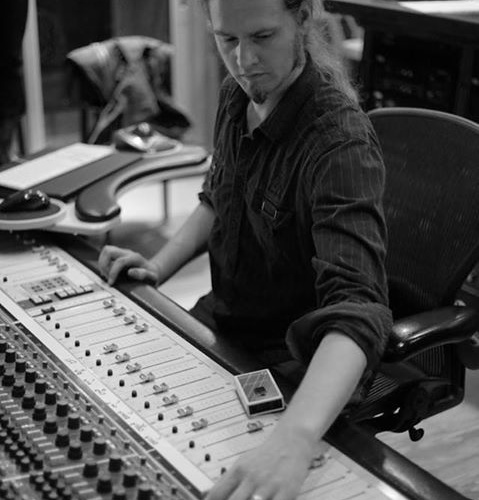
Julian Dreyer
I grew up in the mountains of Western North Carolina in the small artist community of Celo. Surrounded by musicians and artists both in my family and in the community, I have always been interested and involved in music. I played music throughout high school and subsequently attended UNC Asheville to get a degree in recording engineering.
After graduating Magna Cum Laude with a Bachelors of Science in Music Technology, I moved on to an internship at The Orange Peel where I quickly got a job there as one of the sound engineers. The four years of grinding out live sound production for hundreds of national touring acts gave me the experience I needed to transition into a House Engineer/Producer role at the newly opened Echo Mountain Recording Studio.
Here at Echo Mountain I have worked with many bands in a variety of roles over the past 13+ years and worked my way up to the role of chief engineer earning two GRAMMY nominations and one win along the way. I love music production and recording music and being involved in the creation of art. It is a part of how I grew up and will always be a part of who I am.
I have experience recording all styles of music from rock and blues, Americana and indie-folk, jazz and world, to bluegrass and Celtic music. I enjoy working in all styles and it is inspiring to find the common ground between them and the wider perspective that is informed by the variety.
GRAMMY-winning Engineer Julian Dreyer has received mentions for his work in Mix Online, Tape Op, National Geographic, The Mountaineer, No Treble, High Country Press, Smoky Mountain News, Music Rag, Citizen Times, and Winston-Salem Journal.
He has worked on recordings by The Avett Brothers, Steve Martin, Secret Agent 23 Skidoo, Widespread Panic, The Parlor Mob, Band of Horses, and many more. He is an API Audio artist and New Music USA member.
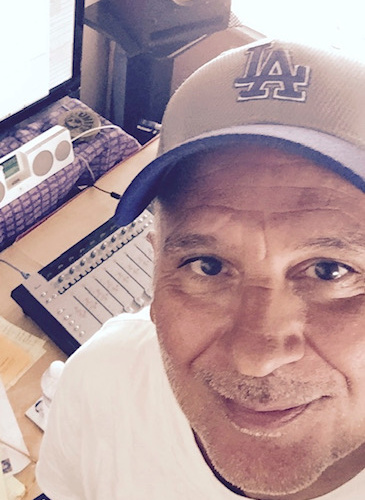
Brian Scheuble
Brian Scheuble is an independent mix and recording engineer. He has done work at Burbank, CA’s famed El Dorado Studios, Hollywood’s EastWest Studios, and San Diego’s Rarefied Recording, among others.
His career has received nods in American Songwriter, Mix Online, Women of Country Music, Total Rock, Guitar World, Light Sound Journal, SD Voyager, and Reverb.com.
Credits:
Zac Brown Band – Need To Breathe – Finger Eleven – Dave Matthews – Madi Diaz – Sheryl Crow – Trevor Hall -Five For Fighting – Brett Dennen – Serena Ryder – Tom Petty – Leann Rimes – John Mayer – Ice Cube – Aimee Mann – Phoebe Bridgers – Fiona Apple “TIDAL” – X – Ben Lee – Wallflowers – Sons Of Anarchy Show & Album – Elton John – Katey Segal – Danny Barnes – A Fine Frenzy – Matt Nathanson – Rachael Yamagata – Train – Whitesnake – Stevie Nicks – Five For Fighting “America Town” – Bethany Dillon – Edie Brickell – Backstreet Boys – Eric Hutchinson – Jon Bon Jovi – Robben Ford – Death Cab For Cutie – Stone Temple Pilots – Liz Phair – Michelle Branch – Ry Cuming – Mel Torme – Nine Inch Nails – Ryan Star – Crosby Loggins – Yes Man with Jim Carrey – I Nine – Motley Crue – Ringo Starr – Don Henley – Tom Petty & the Heartbreakers – Robin Zander – Colbie Caillat – U2 – Eric B. & Rakim – Dishwalla – MC Solaar Live – Barbara Streisand – Tina Turner – Adam Cohen – Crash Test Dummies – Marilyn Manson – Charlie Haden & Hampton Hawes – Dandy Warhols – Butthole Surfers – Marit Larsen – Robbie Robertson – Charlie Hayden Hampton Hawes
